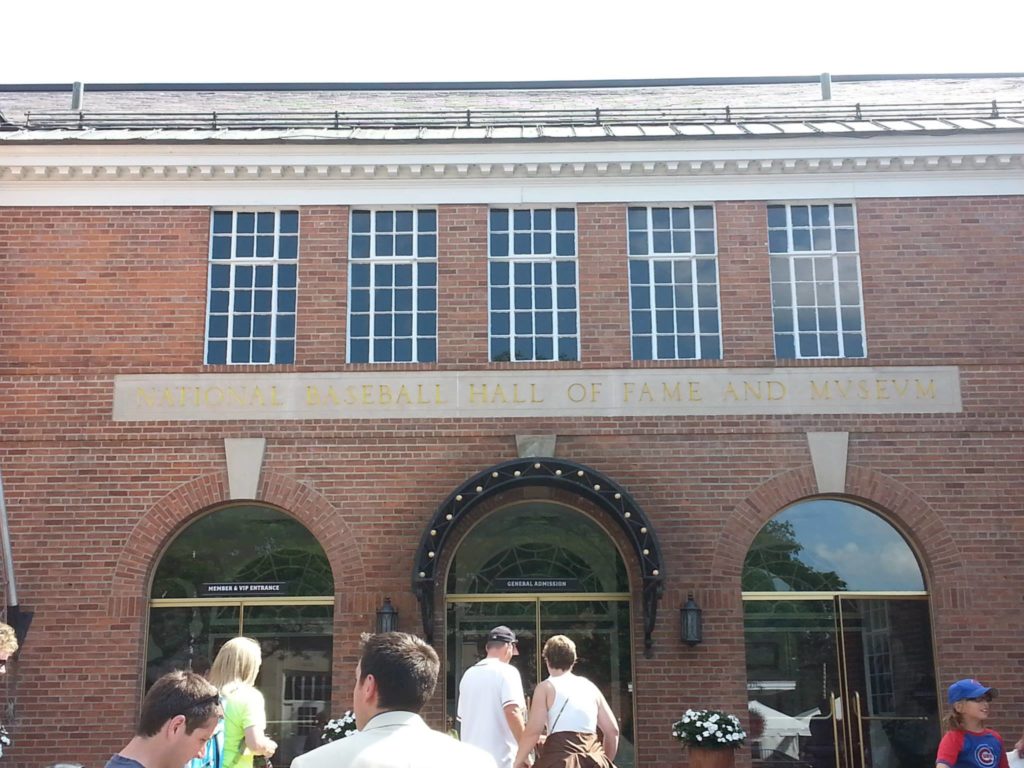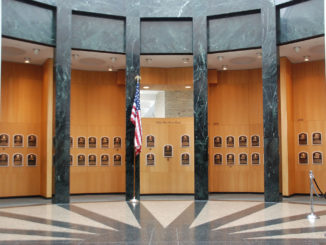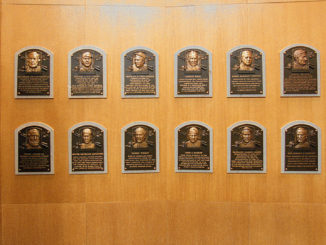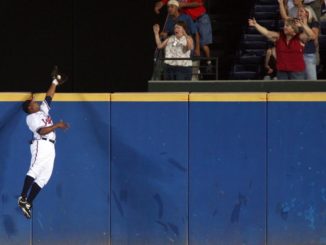2017 Hall of Fame Voting, BBWAA and the IBWAA
Hall of Fame voting is one of my more favorite times of the year. There is always controversy normally surrounding a few players. Whether it be for PEDs, character issues, or just simply performances that have that player on the cusp of enshrinement.
In 2017, there is no shortness of these issues. I enjoy stats just as much as the next guy. However, for me, combing over years and years of career lines isn’t my only consideration. If you’re on the list as an eligible candidate, you had to have some decent numbers.
Obviously, there are guys who are on this list just because they have to be. Guys like Matt Stairs, Casey Blake, Freddy Sanchez, or Magglio Ordonez. All of them had respectable careers, but none of them Hall of Fame worthy.
Numbers can sometimes overpower a conversation and this is a conversation I think gets overwhelmed with numbers; sometimes, an “eye test” is just as important. Needless to say I’m not as hip or smart with the sabermetrics side of evaluating players. While I am still trying to learn, and learn how to apply them, I am sticking to what I do know for this discussion.
If many of you, aside from OFR, also follow Tomahawk Take of FanSided, you’ll know how I stand on many of these players. I like a lot of them. As you also, may or may not know, I have a vote with the Internet Baseball Writers Association of America (IBWAA). We differ from the BBWAA in that our Hall of Fame ballot is missing some players compared to the BBWAA.
My ballot was made public a few weeks ago via Tomahawk Take. As you’ll notice, Tim Raines, Jeff Bagwell, and Edgar Martinez are not listed on the IBWAA ballot. That’s because we already elected those players.
However, as with any Hall of Fame voting, it’s fun to see where different people stand in what they value when evaluating a players career. Is it performance, character, association to PEDs? Whatever their stance, it’s interesting to see how things shake out.
Obviously, in the primer piece from Chris, you see how not only I, but the rest of the writers and guests chose to vote.
There are a few I had to leave off this ballot that I didn’t leave off my IBWAA ballot. On my IBWAA ballot I voted for Jeff Kent, Tim Wakefield, Lee Smith, and Larry Walker. With the IBWAA ballot, I could choose up to 15 names. This one, I could only choose up to 10. I voted for 11 guys with the IBWAA.
The Chosen Ones
Jeff Bagwell
In a career that spanned 15 years, Jeff Bagwell put up some very good, respecting numbers. All 15 were spent with the Houston Astros and he was the headliner in the dreaded “Killer-B’s” line-up. He recorded a career slash of .297/.408/.540/.948 and brought home Rookie of the Year honors in 1991. He was named to 4 All-Star teams, 1 MVP in 1994, 3x Silver Slugger, and 1x Gold Glover.
Bagwell was never what you would call a great defender, posting a -7.9 career dWAR. His achievements were on the offensive side. A career 74.0 oWAR is what helped him obtain an overall WAR of 79.6. He led the league in runs scored 3 times and from 1996 to 2002 had over 100 walks in each of those seasons.
Bagwell’s offensive stats alone are what gets him elected, and quite honestly, that’s all anyone really talks about when the discussion centers on him. His defense lacked severely and if there is anything to really nit-pick about offensively, it’s his clutch rating, which is -5.83 (according to FanGraphs). Bagwell finished his career with 449 home runs.
Tim Raines
Tim Raines has one last shot at baseball immortality. In his tenth and final year of eligibility, Raines hopes to crack the magical 75%. It has widely been criticized of Raines’ inability to get the amount of votes needed to push him over the edge. Raines should have been long ago, in my opinion. However, as fate would have it, he was just up against some top flight performers the last 10 years.
Tim “Rock” Raines played Major League Baseball for 23 seasons. That kind of longevity should stand for something all on its own. In those 23 years, Raines led the league in stolen bases 4 consecutive seasons from 1981 to 1984 amassing no less than 71 swipes in those years. Raines totaled 808 stolen bags. Led the league in runs scored twice and was elected to 7 straight All-Star Games from 1981 to 1987. Oh, and he was the least caught base-stealer in history.
He slashed .294/.385/.425/.810. Raines earned one Silver Slugger award in 1986 when he put up a .334 BA and a .413 OBP. However, unlike Bagwell, Raines did his talking with his legs. A prototypical lead off hitter, Raines knew how to get on base, and make teams pay for it. In 23 years, Raines never put up more than 71 RBI, but he scored over 1500 runs in his career.
An overall WAR of 69.1 and oWAR of 68.4 is weighed down heavily from his base-running ability. Raines -9.5 dWAR doesn’t do him any favors. Conversely, compared to Bagwell, his clutch rating is on the positive side at 5.95.
It’s always difficult for me to evaluate pitchers, especially pitchers in the American League. Therefore, there won’t be much to my snippet for Mussina. My apologies in advance.
A career ERA of 3.68, Over 2,800 strike outs, 270 wins, 5x All-Star, 7x Gold Glove winner, and a 1.192 WHIP. That’s Mike Mussina in a nutshell. A 18 year career split between Baltimore and the New York Yankees.
Mussina never won more than 20 games in any given season, except his last season, where he won exactly 20. He totaled 57 complete games and 23 shut outs.
Edgar Martinez
Edgar Martinez is probably the most purest hitter I ever saw, that wasn’t also a regular position player. Martinez slashed .312/.418/.515/.933, played in 7 All-Star Games, won 5 Silver Slugger Awards.
In 18 years as a pro, Martinez scored 100 or more runs on 5 separate occasions, had an OBP over .400 12 times, and drove in more than 100 runs 5 times as well.
Edgar’s Achilles heel was that he played for a lot of bad Mariner teams. He didn’t reach the playoffs for the first time until 1995, 8 years into his career.
He also played along side some pretty remarkable talent in those years as well, guys like Jay Buhner and Ken Griffey, Jr., that took a lot of eyes off of him. I guess that’s the drawback to being a DH in a time when the DH wasn’t viewed the same as it is today.
Ivan “Pudge” Rodriguez and Mike Piazza were our generation’s Johnny Bench. Pudge, for a time, was the best catcher in the game. He was not only great at the plate, but he was great behind the plate as well.
A 14 time All-Star, 13 time Gold Glove winner, and 7 time Silver Slugger recipient, Ivan Rodriguez was a force to reckon with as a hitter and he was an unbelievable defender. He won the AL MVP in 1999 as a member of the Rangers.
In 21 years, Pudge managed a .296/.334/.464/.798 line. He ended his remarkable career with 311 HRs, 1332 RBIs, 1354 runs, and 2844 hits.
With a career WAR of 68.4, on the defensive side he holds a 28.7 dWAR. His oWAR sits at 53.9. Nine times he ranked first in caught stealing percentage and for his career caught almost 46% of base runners attempting to steal.
He won one World Series as a member of the 2003 Florida Marlins and was named NLCS MVP of that same year.
Vladimir Guerrero
First of all, before I dive in to Vlad’s numbers, I just want to say Vladimir Guerrero could hit anything, anywhere, at anytime. It didn’t matter if the baseball bounced to the plate, was almost in the opposite batter’s box, or at his head. Vlad just hit; plain and simple.
He hit for average, power, he scored runs and drove in runs. Vlad even had a couple of seasons where he stole more than 35 bags.
Guerrero finished his 16 year career with a .318/.379/.553/.931 line. Elected to 9 All-Star Games, won 8 Silver Slugger Awards, 1 MVP, and finished in the top 5 of MVP voting 4 times. He scored over 1300 runs, was 4 RBIs short of 1500, walked 737 times, and hit 449 home runs.
Vladimir Guerrero could hit anything thrown at him, and it was fun to watch. You always wanted him on your team, and hated when he came to town as a visiting player. His career WAR isn’t as high as some of the other candidates, but 59.3 WAR and a oWAR of 58.5 isn’t anything to scoff at either.
Vlad’s -10.7 dWAR doesn’t seem to fit with the guy I remember. I thought he used to be a very good, above average defender. Looking at his career breakdown from baseball-reference, this dWAR has everything to do with his propensity for committing errors.
Guerrero led the league in errors committed by a right fielder 9 times and ranks 5th all time in the same category with 125. He also ranks 20th all time for double plays turned as a right fielder with 32, and 126 assists, good enough for 28th.
When you have a Major League Award named after you, before you are even in the Hall of fame, chances are you get elected to the Hall of Fame. For some weird reason, Trevor Hoffman has yet to be enshrined.
A 7 time All-Star and 601 career saves speaks a lot to Hoffman’s longevity. A career ERA of 2.87 with a 1.058 doesn’t hurt either. As primarily a closer, he logged 1089.1 innings, struck out 1133 batters (that’s a 9.4 SO/9) and walked 58.
Like I said before, evaluating pitchers isn’t easy for me. However, I know a really great pitcher when I see one, regardless of whether he is a reliever or starter. Trevor Hoffman is a Hall of Famer, period.
As Braves fans, we’re all familiar with the work of Fred McGriff. There’s not much I can really say about the Crime Dog that all of you don’t already know.
McGriff was a 5 time All-Star and won 3 Silver Sluggers. He finished in the top 10 of MVP voting 6 times and, of course, helped Atlanta secure its first World Series in Atlanta. The Crime Dog concluded a 19 year career with a slash of .284/.377/.509/.886. His career average would have been higher if were not for his final season. McGriff only played in 27 games that year, but only could muster a 181 average.
50 hits shy of 2500, 51 runs scored shy of 1400, 50 RBI shy of 1600, and 7 HR’s shy of 500. Like everyone else has pointed out, McGriff easily reaches 500 home runs if the 1994 and 1995 seasons aren’t shortened because of the player strike.
McGriff’s career WAR of 52.4 and oWAR of 55.5 are respectable. However, his dWAR hurts his overall average because it’s a -18.1. McGriff wasn’t the fleetest of foot either. He wasn’t paid to steal bases, though, he was paid to hit. Although, he struck out a lot, 13 times with over 100 punch outs actually, he got on base quite easily. His 1305 career walks helped.
Fred McGriff probably never gets in on a writer’s vote, but he should be in, and if it were up to the fans, he probably already would be.
Here’s where I stray off the beaten path. None of our other writers voted for Jorge Posada, nor the next man on my list.
Jorge Posada was a life-long Yankee that spanned 17 seasons. His quick slash line is .273/.374/.474/.848. A 5 time All-Star and 5 time Silver Slugger, Posada was not only valuable in the box score, but in the locker room as well.
Posada probably gets more love from the writers because of the team he played for, when he played for them. In all honesty, he’s probably a border-line Hall of Famer. But I think the value he provided on the field, managing the pitchers that came through New York has to stand for something.
But let’s look at the comparisons. I haven’t done this with any other player yet, but since I went “off script” so to speak, I feel the need to compare. Aside from his slash line, Posada also has 1664 hits, 275 HRs, 1065 RBIs, 936 walks, an oWAR of 48.4 and a dWAR of 2.1 (notice the positive dWAR).
Hall of Famer Carlton Fisk slashed .269/.341/.457/.797. Granted, Fisk played 24 seasons. Fisk had 2356 hits, 376 HRs, 1330 RBIs, 849 walks, an oWAR of 65.7, and a dWAR of 16.3. Fisk wins hands down, as one comp. BUT he played 7 more years than Posada did. I understand injuries hurt Posada later on, and I don’t like to hold injuries against a player.
However, just imagine if Fisk played only 17 years, or Posada played 24 years? Posada is on the border-line as well. But in 7 more seasons, Fisk only managed 101 more HRs than Posada, 265 more RBIs, 87 less walks, and Posada out slashes Fisk in 7 fewer years played.
Gary Carter played 19 seasons. In two more seasons than Posada, Carter under slashes Posada .262/.335/.439/.773. Carter’s dWAR was off the charts good at 25.5, but his oWAR is not too far off. Carter still out performs with an oWAR of 55.6. Though, in 2 more years than Posada, Carter has only 49 more HRs, 160 more RBIs, and 88 fewer walks.
I’ll probably get blasted for these comparisons, but I think they are worth at least considering.
Last, but certainly not least, Billy Wagner. Wags retired a Brave in 2010 and he had a very good career. Realistically, I don’t think Billy Wagner gets in, but I think he should receive enough votes to stay on the ballot.
Wagner holds a career ERA of 2.31, 0.998 WHIP, 422 saves, 903 innings pitched, 1196 strike outs, but walked 300 batters. Wagner could arguably be credited with the success of former Brave Craig Kimbrel.
A lower career ERA and WHIP than Trevor Hoffman and 63 more strike outs than Hoffman, help to build a decent case for Wagner. The walks allowed on the other hand, doesn’t help Wagner’s case. His 11.9 SO/9, though, does. He also has a winning record of 47-40. That’s on thing Hoffman can’t brag about.
The Pay Off
There you have it. My Hall of Fame votes and why I think they deserve consideration for enshrinement. I now open the floor up for debate.
I hope you enjoy this, and all our writer’s take on the Hall of Fame, opinions, and reasons for why we chose the way we did.





Hip hip! Jorge!